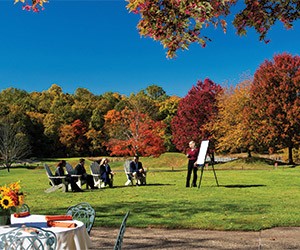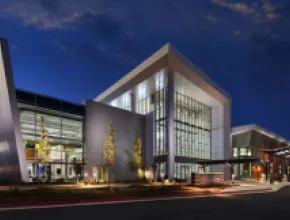A decade or so ago you could grasp everything you needed to know about conference centers eponymously; they were a physical place to confer, first and foremost. Education was a conference hallmark, with a dash of networking thrown in, but items like teambuilding and entertainment were clearly lower priorities, with F&B seen almost as a necessary evil.
But changes have come, and dramatically so. Suddenly, the conference centers of today are more about standing out than fitting in, with an emphasis on experiential offerings, cutting-edge tech and memorable gatherings.
The IACC Perspective
The International Association of Conference Centres (IACC) is one group at the locus of this shift, with a recent move to emphasizing the event experience rather then the venue alone.
The changes were in full display at the recent IACC Americas conference in Los Angeles, with lively fun that included sessions being kicked off by rock bands, beach balls bouncing through the audience, and the high-caliber Copper Skillet cooking contest providing a sizzling culinary showcase for attendees.
“Our members are no longer looking exclusively at best practices within the hospitality industry. We are now incorporating the latest innovations in other industries, including design, fashion and general retail,” said IACC CEO Mark Cooper.
PageBreak
News from the Old Country
Part of IACC’s recent growth, which also includes the launch of a robust Australia-Asia-Pacific Chapter, has been the incorporation of 38 Chateauform “Seminar Houses” across Europe, reflecting the diversity and singular experiences that conference centers are now striving to showcase.
These venues are essentially comprised of spectacular estates that offer the all-inclusive complete meeting packages, and the audiovisual bells and whistles planners rely upon, in singular settings that might spur thoughts of Robin Leach rather than your typical meeting attendee. And while they may not be a fit for every group, they certainly illustrate the changing face of the conference center experience.
“There are core standards that set them and other IACC members apart from the rest of the crowd, but also you see those clever twists that enhance the experience for delegates and organizers alike,” Cooper said.
Day Trippers
Another potential trend appears to be the growth of the day meeting, with companies saving lodging and possibly transportation costs as well by distilling gatherings into a single-day function held off-site. These events are particularly popular with highly purpose-driven efforts, such as staff training, that don’t necessitate the frills and robust agenda of a more full-fledged conference.
Convene is a pioneer in the day venues field, with recent success that shows that heir concept of all-inclusive day meetings is appealing to planners. The company has four bustling venues in Manhattan—including a Park Avenue branch that was completely sold out from December ’13 to March ’14—and delved outside of New York in April with a venue launch in McLean, Va.
Chris Kelly, president and co-founder of Convene, said that part of the company’s success is due to its one-stop-shopping approach that emphasizes technological ease.
“The way that technology has traditionally been provided is not only inconvenient but it also makes meetings less productive,” Kelly said. “As opposed to providing resources upon request, we build in all of the tech that we could reasonably assume our clients could need in a meeting room so that it is there when it is needed.
“Everything is user-controlled but our on-site techs are also there to assist depending on the client’s preference,” he continued. “Gen Y and Millennials would rather do it themselves, whereas older generations appreciate having someone there to assist. “
PageBreak
Benchmark Joins the Club
Benchmark Hospitality, which has been a major player in the arena for decades, officially launched its own umbrella grouping of designated conference centers in March. The criteria for Benchmark Conference Centers (BCC) members includes IACC membership—or at least adherence to the IACC standards—in addition to the presence of a high-caliber culinary team and other items.
Benchmark has undergone other big changes as well in recent months, with Alex Cabanas stepping into the role of president and CEO, with his father Burt Cabanas—a longtime mainstay of the hospitality industry—remaining in an active role as chairman. For the group’s new leader, the ability for venues to adapt for groups is the current key to conference success.
“The single word I would use to describe the dramatic change in the conference center industry is flexibility,” Alex Cabanas explained. “Planners and attendees want customization, so while the traditional CMP is still a great value and product for planners, they want alternatives and flexibility.”
Cabanas also gave support to the growing emphasis on the overall experience over the mere venue structure.
“Conference centers still deliver the best meetings experience, not only because of the physical product but also because of the passionate people who know how to sell, service and deliver for meeting planners,” he said. “Anyone can build the facility but not everyone is dedicated to the staffing and attitude that will deliver the service. This is where conference centers excel.”
Notes from the North
At the sleek Banff Centre in Alberta, Canada, Jodi Burke, director of sales and conference services, opined that her venue is all about results, which it spurs through collaboration and communication.
“When it comes to searching for a meeting venue, today’s planners are looking for more than just bedrooms and meeting space,” Burke said. “They have specific goals to accomplish, and they will be required to show a demonstrable value from their meetings. We begin by collaborating with the planner on a strategic meeting plan that will fulfill the goals and objectives set for their meeting. And at the end of the event, we offer follow-up to help planners gauge results.”
Of course, one could argue that the purpose of an effective conference has always been about results. But looking at today’s trends toward flexibility, innovation and the overall event experience, modern conference centers are taking a very different path toward that end goal.






